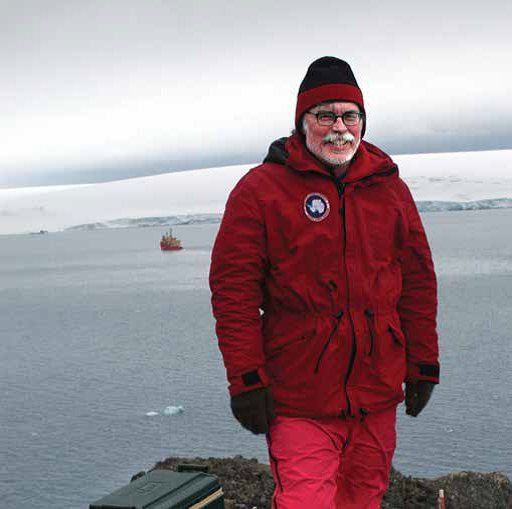Frohlich Named First Senior Research Scientist Emeritus
April 5, 2018

Cliff Frohlich has had a remarkable career at the University of Texas Institute for Geophysics, spending 40 years studying earthquakes of all kinds, whether they start deep in the earth, at the bottom of the ocean or are caused by human activity.
Frohlich’s stellar research has earned him the reputation of a pioneer, someone who is always willing to explore the big questions and follow the science wherever it goes. Given this reputation, it is fitting that Frohlich has been appointed Senior Research Scientist Emeritus, the first such honor granted to a research scientist at The University of Texas at Austin.
“Having the ability to honor our research scientists in this way for the tremendous contributions they make to the university and to science is long overdue,” said UT Jackson School of Geosciences Dean Sharon Mosher. “Cliff is a wonderful standard bearer for the group.”
Emeritus status is an honorary title that can be bestowed on a fully tenured professor after retirement to honor their work. The status often allows them to keep office space after retirement and continue to carry on some duties at the university.
Many schools and departments in the university employ research scientists as well as faculty. Nowhere is it more common than at the Jackson School, where two of the school’s research units – UTIG and the Bureau of Economic Geology – employ about 100 research scientists to lead their world-class programs and projects. The Jackson School lobbied for the emeritus status to be opened to senior research scientists after retirement, a move that was endorsed by the university and the University of Texas Board of Regents, which approved Frohlich’s new title on Feb. 27.
“I am proud to now hold the title of Senior Research Scientist Emeritus,” Frohlich said. “I’m nonplused to learn that I’m the first individual at UT ever to receive this title. This surprises me, especially since during my 40 years on the 40 Acres I have known several non-faculty UTIG scientists who certainly deserved it.”
UTIG Director Terry Quinn said he is thrilled that the new status is now available to research scientists and that Frohlich will be able to continue his association with the institute after retirement.
“Cliff has had a remarkable academic career, 40 years of which was at the Institute for Geophysics,” Quinn said. “He is a Renaissance man, equally comfortable writing and editing books on earthquakes as he is on the physics of sports. Cliff’s new emeritus title will allow him to continue to contribute to the academic culture at the institute.”
Frohlich started his career at UTIG in 1978 in Galveston, where UTIG was originally located, and later moved to Austin when the institute moved in 1982. At the time, he focused on ocean bottom seismography, but has since researched earthquake statistics, deep earthquakes, moonquakes, Texas earthquakes, and human-made earthquakes. The latter is what Cliff is best known for recently, with his phone regularly ringing as soon as an earthquake is felt in Texas.
“UTIG has been great because I have had the freedom to work on almost any kind of question that interested me,” Frohlich said. “And because I have always been surrounded by wonderful, supportive colleagues— colleagues who sometimes have involved me in fascinating collaborations; colleagues who, year in and year out, are making impressive advances in the earth sciences.”
Frohlich also served as UTIG associate director for the past 20 years.
“I am especially grateful that Cliff provided me with his unvarnished perspective on issues regarding the institute, which resulted in a more informed process in my decision making,” Quinn said.
In retirement, Frohlich plans on continuing his research at UTIG, continuing his work as a visiting scientist at Southern Methodist University, spending more time with family, and working on hobbies, including woodworking, cycling, and writing.
For more information, contact: Anton Caputo, Jackson School of Geosciences, 512-232-9623; Monica Kortsha, Jackson School of Geosciences, 512-471-2241
